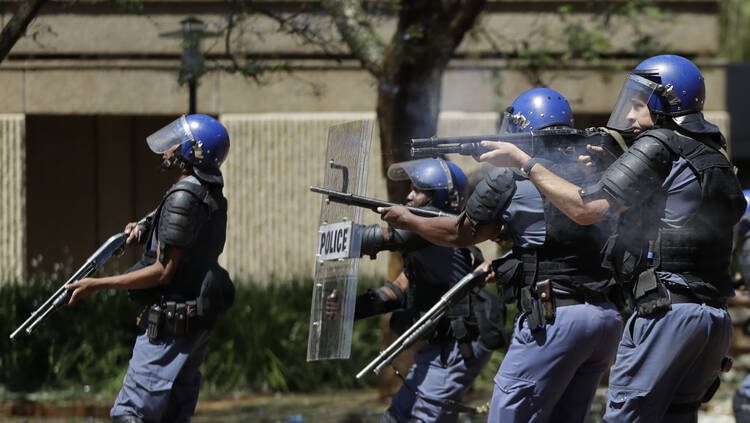Jesuits in South Africa report that Graham Pugin, S.J., who was shot in the face by a rubber bullet at the entrance to Holy Trinity Catholic Church in Braamfontein, a Johannesburg suburb, “has received medical treatment and is recovering.”
In the statement released on Oct. 11, David Rowan, S.J., said, “The shooting of [Father] Graham has shocked and distressed many people, including students. He, along with the Society of Jesus, remain hopeful that a solution can be achieved.”
Father Rowan added, “We are concerned by the levels of violence and urge all parties to exercise maximum restraint so that an atmosphere conducive to negotiations may return.
“We appeal to all involved to pledge themselves to restore peace on and around our campuses.”
According to the statement, “The Society of Jesus...and [Father] Graham himself, are grateful for the concern that has been shown after the incident. We have received many prayers, well wishes and offers for assistance from across society. We have also received support from the Jesuit General Congregation meeting in Rome at present and the Vatican Ambassador to South Africa, His Excellency Archbishop Peter Wells.”
Related: 'Hell Broke Out' in South Africa
Father Pugin had been performing the role of a one-man barrier to police units that had been seeking to enter the Holy Trinity compound when he was wounded. Students had been fleeing there to escape police during widespread disturbances at the nearby University of the Witwatersrand. After a fourth attempt to enter the compound, police fired rubber bullets at the entrance, striking Father Pugin in the chest and face, according to witnesses at the scene. Most of the incident was captured on video by South African media.
Students have been protesting for weeks over plans to raise tuition fees at Witwatersrand and other universities across South Africa. The students, many of whom come from impoverished backgrounds, say the fee hikes make higher education impossible for them to attain. They charge that the Zuma administration had all but guaranteed a free tertiary education to students as a form of social equalizer in the still economically and racially divided society of South Africa.
Even as Father Rowan made his appeal for calm, scattered clashes between students and police continued on Oct. 11. Student protests have forced the closure of other universities in South Africa and prompted warnings that students might not be able to complete the academic year.
The government says it does not have enough money to provide free higher education and that it will cover fee increases for poor students next year. Protesters, however, say the concession does not go far enough.
"The students at the moment are saying, 'We cannot stop protesting until government accepts that education must be free with no qualification,'" South African President Jacob Zuma said during a visit to Kenya on Tuesday. "It will be very difficult to pay, as a government, for a child of a parent who has every means to pay," Zuma said at a news conference with Kenyan President Uhuru Kenyatta. "We who have the means must support the system for the benefit of the country. That's what we are saying, that's our position and that's what we are engaging the youth on."
The Jesuits in South Africa report that Father Pugin has been among the facilitators, along with other clergy and former student leaders, “working towards an agreement between the students, management and other stakeholders at the University of the Witwatersrand.”
Father Rowan reports that the facilitators “have worked hard to create an atmosphere of trust. Holy Trinity Catholic Church in Braamfontein has served as a safe and sacred space for negotiations, and we hope that it will continue to do so.”
He added, “Unfortunately, the negotiation process has been stalled and we are concerned by the sense of distrust between all the role players. The high security presence and clashes between police and students have also heightened tensions, making negotiations, at this stage, much more difficult.”
Noting that the Jesuit community is ready to assist in continuing dialogue, Father Rowan argued that the establishment of a national government task force will not be enough to resolve the fees crisis. “We believe there needs to be a national mediation effort to resolve the fees issue and stabilize the situation on campuses,” he said.
“We believe there needs to be a concerted effort, involving all sectors of society, to deal with the historical context and systemic problems which make higher education inaccessible and unaffordable for millions of poor South Africans.”








